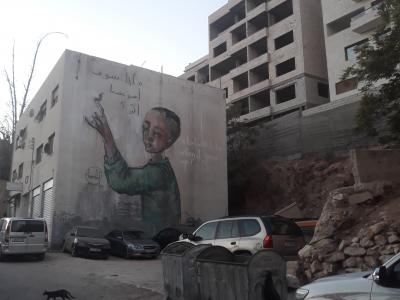
A guest blog by Dr Ali Kassem, Alwaleed Postdoctoral Fellow 2021-22:
On 28-29 April 2022, a two-day hybrid roundtable workshop was held at the Institute for Advanced Studies in the Humanities as part of the Institute Project on Decoloniality. The workshop title was ‘The Arab-majority and Muslim-majority Worlds in/and Contemporary Decolonisation Debates’.
The workshop’s key purpose was to think through the meanings of decolonisation and decoloniality from the positionality of the Arab-majority and Muslim-majority worlds and those dwelling within them. It accordingly aimed at bringing together scholars working across disciplines, questions, problems, and geographies to reflect on contemporary imperial and colonial challenges as well as ways forward. In this respect, it sought to create an informal communal and generative environment for conversations and exchanges. In formulating, circulating, and disseminating the workshop information, much attention was given to attracting participants based in the global south in general, and in the Arab-majority and Muslim-majority regions themselves. The range of the abstracts received was testament to the breadth and wealth of scholarship being produced across the global south – one those of us based in the global north standardly miss.
After a difficult selection process, the workshop was held with 8 papers and 16 participants in total including presenters and discussants (see below for schedule including list of papers and presenters). Through this, it managed to put the ‘decolonial turn’ in conversation with various challenges and happenings from spaces as varied as Indonesia, Egypt, and Nigeria and topics as different as higher education, ecology, and development, and violence. Each paper was allocated one hour, with around 20 minutes for presentation and the remainder of the time for discussion and feedback. This generous format was essential to create an intimate in-depth space that would allow in-depth and rich thinking-alongside.
The planning and holding of the workshop faced a number of different challenges. Namely, the UK higher education sector was (and continues to) face industrial action including strike action. This complicated the assignment and participation of discussants, as well as the planning and preparation for the workshop. Further, the pandemic and related restrictions had a significant impact on the workshop, especially as three of its participants tested covid positive within the few weeks preceding the workshop. Most importantly, perhaps, would be holding such a workshop in Edinburgh – the capital of Scotland and one of the world’s prime Imperial metropoles. Indeed, the irony of holding the workshop in a city, university, and space, built and formed through colonisation did not go missed by the workshop participants and discussions.
Yet, the workshop was a huge success on various scales – opening much room for generative conversations, collaborations, and exchanges and allowing a space for critical and liberatory exchanges that are seldom held within the westernised university. While its success and achievements are certainly multi-faceted, I would posit here that its greatest feat was bringing together a wide-ranging group of scholars, researchers, and activists from across Arab-majority and Muslim-majority spaces to have a conversation speaking to one another concerned by the region’s problems and challenges rather than speaking to Euro-America or the westernised university’s disciplines and questions. The difference between these two sorts of conversations cannot be understated.
A number of collaborations and breakout exchanges have already emerged from the workshop among participants with specific regional or disciplinary interests. This is to be taken further through two main avenues. The first is a continuous virtual conversation with the workshop participants through an email thread. This is planned to lead to a future follow-up virtual meeting during autumn 2022 to return to some of the many questions that the workshop generated. The second is a planned journal special issue to be developed during 2022-2023 around the theme of coloniality and the Arab-majority and Muslim-majority worlds.
